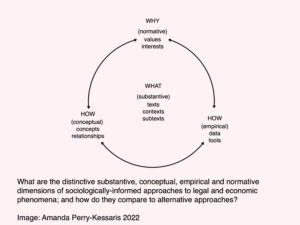Diamond Ashiagbor, Prabha Kotiswaran and Amanda Perry-Kessaris
A decade ago, attention within academia and beyond was focused on learning lessons from the 2008 financial crisis. We shared an interest in how sociologically-inspired approaches might enhance our ability to (conceptually and empirically) investigate and (normatively) assess relationships between law and economic life; in drawing on and collaborating with early career researchers; and in maintaining a global orientation.
Towards an Economic Sociology of Law
We began an Economic Sociology of Law reading group, which then blossomed into an invitational workshop, ‘Towards an Economic Sociology of Law’, and special issues of the Journal of Law and Society (2013) and the Northern Ireland Legal Quarterly (2014).
Contributing to those special issues were:
- Diamond Ashiagbor on ‘Embedding trade liberalisation in social policy: a research agenda on social regionalism and the Global South’
- Ritu Birla on ‘Maine (and Weber) against the grain: towards a postcolonial genealogy of the corporate person’
- Fred Block on ‘Relational work and the law: recapturing the Legal Realist critique of market fundamentalism’
- Roger Cotterrell on ‘Rethinking ‘embeddedness’: law, economy, community’
- Ruth Dukes on ‘A global labour constitution?’
- Sabine Frerichs on ‘From credit to crisis: Max Weber, Karl Polanyi, and the other side of the coin’
- Antara Haldar on ‘Law and development in crisis: an empirical challenge to the current theoretical frames’
- Prabha Kotiswaran on ‘Do feminists need an Economic Sociology of Law?’
- Andrew Lang on ‘The legal construction of economic rationalities?’
- Amanda Perry-Kessaris on ‘Anemosity, apatheia, enthousiasmos: An Economic Sociology of Law and wind farm development in Cyprus’
- Kerry Rittich on ‘Making natural markets: flexibility as labour market truth’
- Kenneth Veitch on ‘Law, social policy, and the constitution of markets and profit making’
- Clare Williams on ‘What can ESL offer to the data collector? Describing, defining, designing and deploying an alternative ESL approach’
Also participating in the 2012 workshop were Dzodzi Tsikata on ‘Socio-economic conditions, employers’ perspectives and the possibilities of legal and policy reform of domestic work’ and Rohit De on ‘“Commodities must be controlled”: economic crimes and market discipline in India (1939–1955)‘.
One aim of that venture was to highlight the deficiencies of dominant, under-socialised, economic approaches to law. Another was to place economic sociology of law in the broader context of sociological approaches to law—weaving together the work of ever-influential Max Weber with that of, then newly resurgent, Karl Polanyi; as well as with heterodox feminist and post-colonial re-conceptualisations of economy, market and law to account for unpaid and subsistence activities, non-linear trajectories of capitalism and alternate vocabularies of justice.
The economic lives of law
In 2022, we returned to the theme of Economic Sociology of Law, and sociologically-informed approaches to law and economy more broadly. We organised three sessions of papers exploring ‘The Economic Lives of Law’ at the Law and Society Association Global Meeting in Lisbon, which was co-sponsored by the Socio-Legal Studies Association.
The panels included the following papers (links to video recordings, text or slides are embedded in titles where available):
- Diamond Ashiagbor on ‘Economic sociology of law and the racial constitution of labour markets’ [video]
- Ruth Dukes on ‘Neoliberalism and labour law’ [slides]
- Isabel Jaramillo on ‘Family law and the care revolution: perspectives from Latin America’
- Cyprian Kambili ‘How can economic sociology of law provide insights on informality in African economies?’
- Prabha Kotiswaran ‘Revaluing unpaid care: insights from an Indian experiment’ [text]
- Allison Lindner ‘Policymaking for sustainable development: a case study from the South African waste management economy’ [video]
- Ambreena Manji ‘Searching for care labour in African social history’
- Moritz Neugebauer ‘In praise of the econo-socio-legal: The growth of atypical work as an epistemological coup’
- Lyn Ossome ‘Gender, violence and the “captive maternals”’
- Amanda Perry-Kessaris ‘Designerly ways with law and economy’ [video]
- Saadat Pirzada ‘Regulating the market for force: a study of the legitimacy and legality of private military and security companies in the United Kingdom’
- Clare Williams ‘The role of generative metaphor in the economic life of the law’ [video]
One of our aims was to explore how scholarship on law and economy has progressed. Another has been to consider sociologically-informed approaches to law and economy in the context of the growing interest in the field of Law and Political Economy (LPE). What are the points of contact and difference in these approaches, their relative strengths and weaknesses?
These are the threads that we intend to follow in the decade ahead.


Leave A Comment